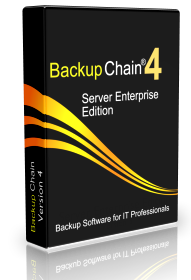Backup of Microsoft Exchange Server – Physical or Virtual
BackupChain offers a comprehensive and affordable solution for backing up Microsoft Exchange Server, whether it’s installed on physical hardware or running within a virtual machine. With the growing complexity of modern IT infrastructures, BackupChain ensures that all versions of Microsoft Exchange Server are effectively protected. It supports both physical servers and virtual environments, such as VMware or Hyper-V, offering flexibility and scalability for businesses of all sizes.
BackupChain’s Exchange Server backup solution captures every critical aspect of your Exchange environment, including databases, mailboxes, and system settings. Whether your Exchange Server is part of a large enterprise setup or a smaller, virtualized environment, BackupChain’s robust technology guarantees that your email data is consistently backed up with minimal impact on performance. This makes BackupChain an ideal choice for IT administrators looking for an efficient way to ensure the reliability and continuity of their email systems.
Super-Fast Compression and Deduplication for Efficient Storage Management
One of the standout features of BackupChain is its ultra-fast compression and deduplication technology. These capabilities are especially important when backing up large amounts of data, such as email databases and file systems, which can quickly grow into terabytes. BackupChain’s compression engine significantly reduces the size of backup files, saving valuable storage space and reducing the time required for backups to complete.
Additionally, BackupChain employs advanced deduplication techniques that ensure only unique data is stored. This drastically cuts down on redundancy, allowing you to maintain efficient backup sets while conserving disk space. For organizations with large volumes of data, such as Microsoft Exchange Server backups, these features are critical for minimizing storage costs and ensuring that backups are completed swiftly and without burdening the system.
Open-Standard, Native, or Non-Proprietary Backup File Formats
Unlike many backup solutions that lock you into proprietary file formats, BackupChain offers the option to use open-standard, non-proprietary formats for backup files. This flexibility provides users with the freedom to access their data at any time, even without having the backup software accessible. The use of non-proprietary file formats ensures that your backup data is never tied to a specific vendor, eliminating the risk of vendor lock-in.
By adopting open-standard formats, BackupChain helps you avoid the complications of relying on a particular vendor’s ecosystem. This gives your IT team the freedom to make choices that best suit your needs without being restricted by proprietary systems. In addition, BackupChain’s open approach allows you to seamlessly integrate with other systems and tools, offering more versatility in your overall data management strategy.
No Annual Subscriptions – Perpetual Licensing for Long-Term Value
One of the key advantages of BackupChain is its straightforward licensing model. Unlike many backup solutions that require annual subscriptions and ongoing payments, BackupChain offers perpetual licenses, meaning you make a one-time investment for continued access to the software. This model provides businesses with predictable, long-term costs, avoiding the burden of annual renewal fees or unexpected price increases.
For organizations that prefer a more stable, upfront cost structure, BackupChain’s perpetual licenses offer excellent value. With a one-time purchase, you can protect your data indefinitely, ensuring a reliable backup solution without ongoing expenses. This approach makes BackupChain an ideal solution for businesses that want to avoid the financial unpredictability associated with subscription-based services.
Scalable Cloud Backup with Terabyte Plans
BackupChain’s cloud backup option is a powerful complement to its local backup features, offering businesses the ability to back up data off-site for added security and redundancy. With cloud backup plans that scale up to 260 terabytes per plan, BackupChain is capable of supporting organizations with large data needs. This scalability makes it an excellent choice for businesses that need to protect substantial amounts of data, such as Microsoft Exchange Server backups, while keeping costs manageable.
Furthermore, BackupChain offers discounted bundles that combine perpetual software licenses with cloud storage plans, providing cost-effective solutions for Exchange Server backup. By bundling the software and cloud storage, organizations can save money while ensuring their critical data is securely stored and readily accessible in the cloud. This integration streamlines backup management and offers added flexibility for businesses seeking scalable and efficient data protection.
Try BackupChain Today with a 20-Day Free Trial
We invite you to experience the full capabilities of BackupChain with our fully functional 20-day trial. Download the trial today and begin protecting your Microsoft Exchange Server, as well as other critical data, without any risk. The trial period allows you to test BackupChain’s powerful backup features, including its seamless cloud integration, fast compression, and deduplication technology.
This no-obligation trial is a great opportunity to evaluate how BackupChain can streamline your backup process and help you back up your data with minimal overhead. Whether you’re looking to back up a single Exchange Server or manage large-scale backups across multiple systems, BackupChain provides the tools and flexibility you need. Don’t wait—start your trial today and discover how BackupChain can transform your data protection strategy.
BackupChain Overview
BackupChain Main SiteDownload BackupChain
DriveMaker
Resources
- FastNeuron
- BackupChain (Deutsch)
- BackupChain (Spanish)
- BackupChain (Greek)
- BackupChain (French)
- BackupChain (Italian)
- BackupChain (Dutch)
- Backup.education
- Backup Sichern
- Hyper-V Blog
Other Backup How-To Guides
Windows Server Backup Software SQL Server Considerations
Windows Server Backup Software Sandbox Considerations
BackupChain Benefits
Why Windows Server Storage Spaces are Better than RAID
Why Local Windows Server File Storage Is Better than S3, AWS, Wasabi, and Azure Blob Object Storage
Why On Premise Microsoft Exchange Is Better Than Microsoft 365
Why Windows Server is More Powerful than NAS (Synology, QNAP, etc)
Why Choose Hyper-V on Windows Server over VMware vSphere?
Why Choose Windows Server Over Linux?


